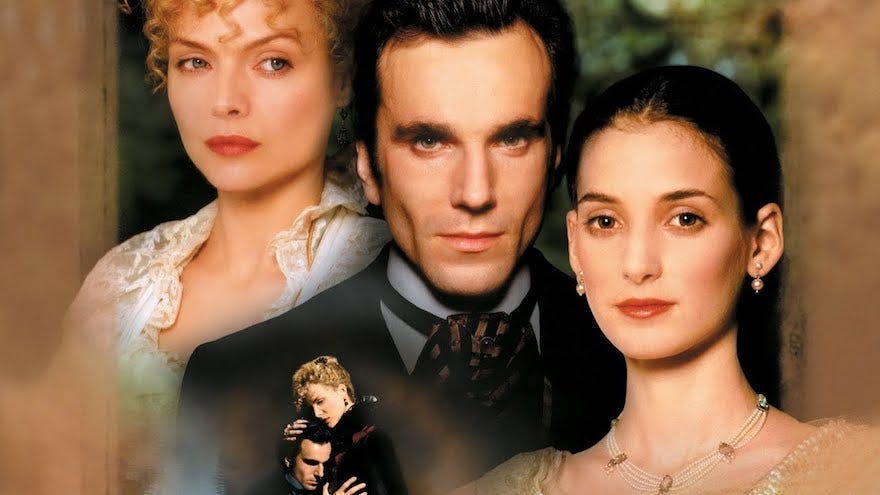Material Girl in a Post-Dowry World
Celine Song’s Materialists sells perfect question—but ends with answers I can’t buy
Minor spoilers ahead.
“I’m a modern woman. I don’t have a dowry. I’m not splitting a kingdom.”1
So why, the ninth bride arranged by matchmaker Lucy (Dakota Johnson) asks, is she getting married?
It’s one of the best moments in Materialists, Celine Song’s new film (which is not a Rom-Com, I swear, no matter how many reputable outlets describe it as such) about modern matchmaking (based on Song’s own experience as such) and the supposedly rational calculus of love. I was all in for was a movie that considers marriage with the analytic structure of a Jane Austen novel — but unlike a Jane Austen novel, doesn’t end in marriage. Because we’re not living in Jane Austen’s time, and the economic and social incentives to get married just aren’t the same anymore. Song, whose Past Lives I loved, seemed like the perfect director to explore the nuances of contemporary partnership.
Sadly, Materialists mostly reaffirms very hetero, very retrograde ideas about love.
To be clear: this is a really good movie. It does what it sets out to do. It provokes. It’s self-aware. It crafts a visual and emotional language that’s striking, elegant, often surprising. I left the theater with ten different questions in my head, which is more than I can say for most movies this year. But the film doesn’t follow the fascinating questions posed in it’s opening scene through. In fact, it seems to forget them entirely.
Instead, we’re led into a love triangle so standard it might as well be wearing a name tag: Lucy must choose between a poor man she loves (for reasons we’re never shown) and a wealthy man who loves her (and actually seems to “check all her boxes,” a phrase oft repeated in this film). Lucy and the broke guy have tried and failed already, miserably, with crying and yelling in the street. And yet — romantic love, Materialists insists, doesn’t need reasons. It just is.
So, that’s where the movie lost me.
If you’ve ever gotten divorced — or had a relationship fall apart under the weight of financial stress, work instability, unequal labor, or just the grinding pressures of capitalism — or if you’ve ever assumed that mutual love and adoration meant shared values, only to realize too late that you never actually explored those values together, then you already know: love is not magic. It’s not a glowing orb of destiny you chase across class lines. It’s choices, logistics, communication. And Materialists seems to know this too — it just can’t bring itself to follow the thought all the way through.
In form and tone, this is a novel of manners — squarely in the tradition of Henry James, Edith Wharton, and, yeah, Austen. It’s filled with drawing room conversations, quiet power shifts, and the language of courtship as economics. But unlike those writers, Materialists doesn’t reckon with the fact that the social and economic structures that gave rise to the genre — the entailments, dowries, inheritance laws, the real danger of spinsterhood — are no longer in play, at least not for middle-class women in New York. (Lucy makes 80K a year. We know this because the movie makes sure to tell us. Question: Is 80K middle class in New York City? In general I felt that the amounts listed in this film were low). The film recreates the architecture of the genre without interrogating whether the stakes still hold.
Instead, we get two choices, neither of which feels truly radical. Lucy ends up with the poor guy, even though none of their past issues are resolved. They don’t discuss children. They don’t reconsider their fundamental incompatibilities. They don’t even acknowledge the option of cohabitation without marriage!! The film flirts with the idea that commitment could look different — but ultimately pulls back, offering us an ending we’ve seen before.
Most damning, there’s a subplot involving a woman Lucy is matchmaking for who is sexually assaulted by a date. She fires Lucy, rightly, and hires legal help. But when the assailant shows up at her house, she doesn’t call the police. She doesn’t call a friend. She calls Lucy. After confirming the man is gone, she tearfully tells Lucy she needs to find a man, because “you need someone to call” in situations like this.
And this, I think, is the film’s most quietly devastating message: in the end, Song is saying you still need a man. Not for money. Not for love. For protection. Because in Song’s world, no one has friends. No one has community. No one has chosen family. It’s a deeply hetero film that simply cannot fathom queer ideas of relationship building that might entail interdependence without hierarchy, intimacy without ownership, or safety without submission. The only available form of refuge is coupling, and the only viable structure for survival is the nuclear unit — flattened of its emotional potential and instead presented as a fortress against the world. It’s not that love isn’t present, but that love is inseparable from a kind of resigned pragmatism.
Materialists wants us to believe in romantic love without ever defining what love really is. As bell hooks reminds us in All About Love, love isn’t a feeling, it’s an action. Care, knowledge, responsibility, commitment, respect, trust. It’s not something you fall into — it’s something you do. But Materialists lets its protagonist choose her partner the same way one might pick a wedding dress: based on some vague internal click that cannot be, and is not, questioned.
It’s not that I wanted the movie to be cynical. But I did want it to be honest.
This might differ from the exact lines slightly, but the gist is intact!







Women's need for a man's protection is one of patriarchy's most powerful and disguised double edge weapon
this sounds depressing but i will def watch it when it comes to netflix or whatever bc i love to have an opinion lol. sidebar: people hated winona in age of innocence but i thought she was perfect in that role! that book is one of my all time faves. are you an edith wharton person?